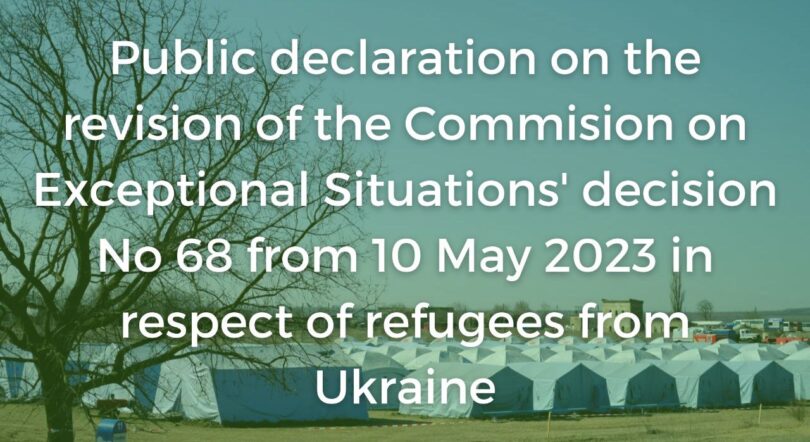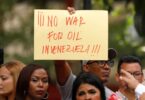[the Romanian language version of this Declaration can be accessed here]
Presidency of the Republic of Moldova
Parliament of the Republic of Moldova
Government of the Republic of Moldova
Commission for Exceptional Situations
PUBLIC DECLARATION ON THE REVISION OF THE DECISION OF THE COMMISSION FOR EXCEPTIONAL SITUATIONS, NO 68 FROM 10 MAY 2023 REGARDING THE UKRAINIAN REFUGEES
Chișinău, 13th of May, 2023
We, the undersigned Civil Society Organizations, express our concern regarding the issuance of the Commission for Exceptional Situations (hereinafter referred to as CES), Decision No. 68 of 10 May 2023 (hereinafter referred to as the Decision).
In this context, we acknowledge with some concern that in paragraph 5 of the Commission’s Order No. 68, as of 15 May 2023, several provisions of previously adopted Decisions of the CES on the special regime for the stay in the Republic of Moldova of refugees from Ukraine who have not applied for temporary protection will be abrogated.
Accordingly, from 15 May 2023, several derogations concerning the right of residence, right of stay and right to work of refugees from Ukraine who have not applied for temporary protection will be abrogated:
- The right to stay in the Republic of Moldova during the state of emergency and until 90 days after the expiry of the state of emergency.
Subparagraph 5.4. of the Decision repealed paragraph 12 of Decision No. 21 of 18 May 2022, therefore, starting from 15 May, refugees from Ukraine who haven’t applied for a form of protection or haven’t obtain a right of residence, may stay on the territory of the Republic of Moldova only for a period not exceeding 90 days. In this regard, the Decision will increase the degree of vulnerability of the refugees from Ukraine in Moldova.
This Decision will negatively affect the work of the General Inspectorate for Migration, which will be unable to process the growing number of applications, increasing the risk of sanctioning persons for illegal residence, simply because they have failed to obtain a status, although they show willingness. In the absence of a clear mechanism to deal with cases of non-compliance with the 90-day deadline, we create the premise of violation of rights at border crossings.
Consequently, there is a well-founded risk that refugees with an expired period of stay and without a legal status in Moldova, returning to Ukraine for a short period of time (for various reasons, including medical, documentation, work, etc.) will face restrictions on their right to enter and stay in Moldova – thus violating the right to life, which is an absolute right.
Monitoring of the implementation of the mechanism for granting temporary protection and other forms of asylum reveals gaps and low efficiency at this stage, conditioned by stringent and impossible to comply requirements for a number of categories of displaced persons regarding the registration of temporary protection status or application for other forms of asylum.
For refugees living in rural areas, remote from local public authorities, for persons from vulnerable groups (elderly, persons with special needs, Roma and other vulnerable groups) the imposition of conditions for the presentation of documents, in particular those confirming residence, in order to receive temporary protection status is a burden, created independently of their will.
All these conditions will generate situations of illegal residence on the territory of the Republic of Moldova. At the same time, their inability to return home because of the war will increase their vulnerability and the risk of becoming victims of corruption and organized crime.
- The right to work without obtaining a temporary residence permit and without having to pay the average wage.
Paragraph 5.2. of the Decision repealed paragraph 7 of the CES Decision No. 4 of 1 March 2022. Consequently, refugees from Ukraine will no longer be able to work without obtaining a temporary residence permit.
Until now, this provision was the legal basis for the employment of refugees from Ukraine. The abrogation of this provision limits the right to work and restricts people’s right to a decent life, as people employed under this derogation risk losing their jobs because they will no longer meet the legal conditions for employment.
Furthermore, sub-paragraph 5.6 of the Decision repealed paragraph 13 of Decision No. 21 of 18 May 2022, whereby employers will no longer be able to employ refugees on a salary lower than the average wage on the economy, which in 2023 is 11 700 MDL. People previously employed on a salary well below the average wage risk being dismissed or informally employed, basically because employers will not want to pay the national average wage when they can hire a Moldovan on a minimum wage.
The repeal of this normative provision will restrict refugees’ access to work and, therefore, respect for the privacy and human dignity of refugees, the right to develop in their circle of interests, increasing the financial burden on the state in providing a decent living.
- The right to obtain a temporary residence permit without presenting a criminal record certificate and without paying the official state tax.
Subparagraph 5.3. of the Decision repealed paragraph 17 of Decision No 14 of 14 April 2022. Thus, refugees from Ukraine can no longer apply for the right to obtain a temporary residence permit without the presentation of a criminal record. And the repeal of point 14 of the Decision No 21 of 18 May 2022, by subitem 5.1 of the Decision, obliges refugees from Ukraine to pay the state fee of 1400 MDL for obtaining the provisional residence permit. In the absence of sufficient financial resources to cover at least the minimum needs, refugees will not be able to cover these expenses and will not be able to obtain the temporary residence permit.
At the same time, refugees who are already employed under the previous provision allowing them to take up employment without obtaining a residence permit will face an additional barrier, as they will have to apply for a criminal record certificate from the already overloaded Ukrainian Embassy in Moldova and pay a 1400 MDL state fee.
- The right of temporary residence for work purposes without a long-stay visa for foreigners who are family members of Ukrainian citizens and stateless persons recognised by the Ukrainian authorities.
Subparagraph 5.7. of the Decision repealed paragraph 16 of the Decision No. 28 of 24 June 2022, as of 15 May, third-country nationals who are family members of Ukrainian citizens staying in the Republic of Moldova will be able to obtain the right of temporary residence for work purposes only on the basis of a long-stay visa.
- The right of temporary residence for study purposes without the presentation of the document confirming means of subsistence.
Subparagraph 5.8 repealed paragraph 13 of Order No. 30 of 13 July 2022 – refugees from Ukraine may enroll in higher education on the basis of obtaining the temporary right of residence for study purposes and only by proving the means of subsistence.
The above mentioned amendments cover all refugees from Ukraine who have not applied for and do not enjoy any form of protection in Moldova. It should be noted that so far only about 3% (3640 people) of the total number of refugees from Ukraine (107 645 people[1]) have applied for temporary protection, out of which only 1894 people have obtained the status of beneficiary of this form of protection.[2] This means that these provisions will affect approximately 97% of refugees in Ukraine in their fundamental rights.
We understand that the CES provision is part of the authorities’ effort to “convince” refugees to apply for the temporary protection mechanism. However, in the context of a deficient temporary protection mechanism – limiting the right to stay on the territory of the Republic of Moldova and to work and guaranteeing these rights only to beneficiaries of temporary protection – is not a fair and just measure.
We reiterate that the Report on the implementation of the temporary protection mechanism in the Republic of Moldova,[3] found that beyond the accessibility and technical problems of the web platform for registering for temporary protection, the biggest difficulty faced by refugees is the confirmation of residence in the Republic of Moldova. Consequently, 47% of respondents did not apply for temporary protection status because they are currently experiencing difficulties in confirming their residence. Likewise, of those intending to apply to the given mechanism (67%), 63% have difficulties in the process of confirming their residence. Moreover, so far mobile teams are not operational to ensure access to temporary protection for the most vulnerable categories of refugees.
The Committee on Exceptional Situations argues that the basis for the repeal of these provisions is to return to the usual framework for regulating the treatment of foreigners. We believe that the return to the usual framework for regulating the treatment of foreigners cannot be adequately justified, given that the circumstances – which initially led to the adoption of these derogations – have not changed. Russia’s war against Ukraine continues and people from Ukraine continue to flee to Moldova on a regular basis.
Accordingly, individuals who continue to take asylum in the Republic of Moldova will not benefit from special accommodation protection. Thus, from the moment of crossing, entry, stay or exit and until temporary protection status is granted, persons will have limited rights and will be treated according to the general legal framework on foreigners.
The CES Decision neglects this objective reality and violates the principle of proportionality, fairness and legal certainty. You cannot ensure the security of the legal relationship when the effects of a provision limiting the rights of refugees from Ukraine enter into force in just 4 days from the date of publication. The fairness of the law cannot be ensured when the apprehension of refugees from a country in the midst of war is regulated by the general legal framework for the apprehension of foreigners, which creates real risks for their life and integrity. “Linking the status of refugees from Ukraine with the status of foreigners results in unfair treatment, given the risks to which the former is subjected and the conditions under which they left their country of origin.”[4]
With a view to ensuring that refugees from Ukraine are provided with sufficient conditions and safeguards to ensure their fundamental rights and security, the signatory organizations,
Therefore we demand:
1. The suspension of action on the provisions of paragraph 5 of Decision No. 68 of the Emergency Commission.
2. The initiation of a broad and comprehensive public consultation process, with the participation of state authorities, international humanitarian organizations, local organizations and initiatives engaged in activities on refugees from Ukraine, internally displaced persons in order to identify the difficulties faced by refugees in the process of applying for Temporary Protection and other forms of asylum, as well as to develop a process to remove these barriers.
Signatories:
- Centrul pentru Politici, Inițiative și Cercetări PLATFORMA
- Comunități Active pentru Democrație Participativă (CADP)
- Centrul pentru Politici și Reforme (CPR)
- Platforma Femeilor Rome ”ROMNI”
- Coaliția pentru Incluziune și Nediscriminare
REFERENCES:
[1] https://data.unhcr.org/en/country/MDA
[2] Homepage of the General Inspectorate for Migration, as published on May 11. Available: https://www.facebook.com/migratieMDA/posts/pfbid0YMcBVDCxVvkiECEruyXQhFK5MUrGU6gmtAuyf7MS9aHcj7qgxSGRt4Wy7eBQr6v7l
[3] Ukraine Situation – Moldova : Quick Assessment on the Implementation of the Temporary Protection in Moldova: Key Findings and Recommendations. Available: https://data.unhcr.org/en/documents/details/99722
[4] Office of the People’s Advocate, Report No. 3 on the monitoring of respect for the rights of refugees in the context of the armed conflict in Ukraine for the period August-December 2022, p. 11. Available:http://ombudsman.md/alaturi-de-ucraina/initiativele-oficiului-avocatului-poporului/raport-privind-monitorizarea-respectarii-drepturilor-strainilor-din-ucraina/









